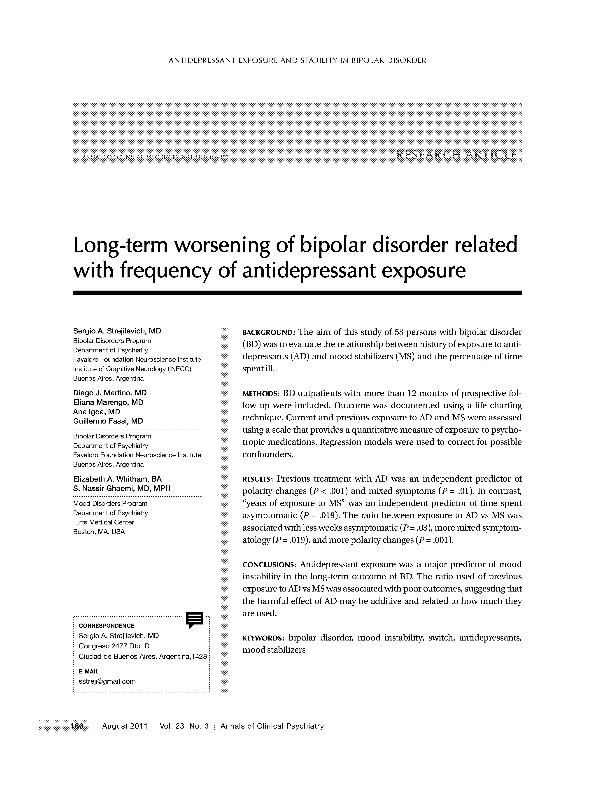Artículo
Long-term worsening of bipolar disorder related with frequency of antidepressant exposure
Strejilevich, Sergio; Martino, Diego Javier ; Marengo, Eliana
; Marengo, Eliana ; Igoa, Ana; Fassi, Guillermo; Whitham, Elizabeth A.; Ghaemi, S. Nassir
; Igoa, Ana; Fassi, Guillermo; Whitham, Elizabeth A.; Ghaemi, S. Nassir
 ; Marengo, Eliana
; Marengo, Eliana ; Igoa, Ana; Fassi, Guillermo; Whitham, Elizabeth A.; Ghaemi, S. Nassir
; Igoa, Ana; Fassi, Guillermo; Whitham, Elizabeth A.; Ghaemi, S. Nassir
Fecha de publicación:
08/2011
Editorial:
Informa Healthcare
Revista:
Annals Of Clinical Psychiatry
ISSN:
1040-1237
Idioma:
Inglés
Tipo de recurso:
Artículo publicado
Clasificación temática:
Resumen
BACKGROUND: The aim of this study of 53 persons with bipolar disorder (BD) was to evaluate the relationship between history of exposure to antidepressants (AD) and mood stabilizers (MS) and the percentage of time spent ill. METHODS: BD outpatients with more than 12 months of prospective follow- up were included. Outcome was documented using a life charting technique. Current and previous exposure to AD and MS were assessed using a scale that provides a quantitative measure of exposure to psychotropic medications. Regression models were used to correct for possible confounders. RESULTS: Previous treatment with AD was an independent predictor of polarity changes (P < .001) and mixed symptoms (P = .01). In contrast, “years of exposure to MS” was an independent predictor of time spent asymptomatic (P = .019). The ratio between exposure to AD vs MS was associated with less weeks asymptomatic (P = .03), more mixed symptomatology (P = .019), and more polarity changes (P = .001). CONCLUSIONS: Antidepressant exposure was a major predictor of mood instability in the long-term outcome of BD. The ratio used of previous exposure to AD vs MS was associated with poor outcomes, suggesting that the harmful effect of AD may be additive and related to how much they are used.
Palabras clave:
BIPOLAR DISORDER
,
OUTCOME
,
ANTIDEPRESSANTS
Archivos asociados
Licencia
Identificadores
Colecciones
Articulos(SEDE CENTRAL)
Articulos de SEDE CENTRAL
Articulos de SEDE CENTRAL
Citación
Strejilevich, Sergio; Martino, Diego Javier; Marengo, Eliana; Igoa, Ana; Fassi, Guillermo; et al.; Long-term worsening of bipolar disorder related with frequency of antidepressant exposure; Informa Healthcare; Annals Of Clinical Psychiatry; 23; 3; 8-2011; 186-192
Compartir



